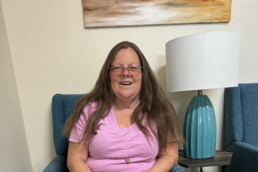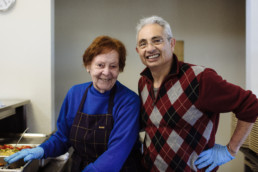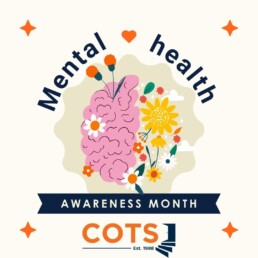Jenn's Story
Jenn P., a Sonoma homeowner for the last 29 years, has worked her way through many of life’s struggles. She started working at 16 and by the time she was 19 years old, Jenn had worked her way up the corporate ladder at a fast-food location down in Mill Valley. Even after leaving that location, Jenn’s strong work ethic did not diminish as she worked at cafes, delis, and other merchandise stores. At each location, Jenn rose to the top of her field and proudly led her teams to success.
She experienced personal milestones too when she married her husband in 1987 and had their only child in 1991. As her daughter entered her schooling years, Jenn began her career in volunteering as a teacher’s assistant and librarian. She was a loving mother figure to every one of her daughter’s friends, reminding them to wear their rubber bands for their braces and organizing a carpool.
Her love and caring attitude also extended to everyone she met. Jenn cared for her mother-in-law who had dementia and her mother as she experienced Alzheimer's. Both incredible women passed approximately two years ago.
It was the overwhelming stress and lack of sleep that Jenn says led her to have a drink of alcohol before going out to buy eggs one morning. While she was in this intoxicated state, Jenn rear-ended another car and was sentenced to probation and over 300 hours of community service.
After her first service placement did not work out, Jenn requested that she be reassigned. Her reassignment brought her to the doors of COTS in September of 2023. With over 25 years of kitchen and service experience, Jenn felt right at home volunteering at the Mary Isaak Center. Jenn volunteered multiple days a week and grew to have friendships with other volunteers and COTS staff.
As she finished her mandated hours in February of 2024, her new friends gifted her with a card and flowers, wishing her the best in her next chapter. But after a week off from volunteering, Jenn came back to COTS. “It's actually helped me being here [at COTS].” While she had the company of her retired husband, she missed the kitchen’s comradery and being able to help those in her community who need support. Having spent time with the clients during her smoking break, she got to know them. “For the most part, a lot of them are really nice people that you know, for some reason or another, they wind up here . . . they're just people who have had problems and they're people just like you and they deserve to have decent food.”
Happy to get out of her house and felt that volunteering at COTS gave her “some sense of purpose because people appreciate what I'm doing.” Jenn has continued to volunteer with COTS regularly and is delighted to help new volunteers learn the ways of the kitchen.
As of May 28th, 2024, Jenn has remained 17 months sober and thanks COTS and sweets for helping her maintain her sobriety.
The COTS Collective: June 2024

June COTS’ Collective.
In early 2023, COTS embarked on a journey to obtain enough funding to complete a large capital expansion project on our main Mary Isaak Center campus in Petaluma, CA. On June 17, 2024, COTS officially began construction on our Recuperative Care capital project—expanding our ability to serve Recuperative Care clients by more than 300% annually.
COTS’ Recuperative Care offers services, meals, and a place to heal for individuals exiting the hospital who are experiencing homelessness. Receiving care in the COTS Recuperative Care program is 25x less expensive than spending a night in the hospital. Last month, we asked for your support to help COTS get this project across the finish line—our heartfelt thanks to our community for stepping up to support the completion of this project! This project will be complete by the end of October, providing a critical benefit to the Sonoma County community for decades to come.
Last month, COTS also increased our shelter capacity by ten beds, allowing us to reduce our waitlist times, and increase the availability of accessible bed space for individuals with disabling conditions. As the second largest shelter provider in Sonoma County, COTS takes seriously our commitment to ensuring equitable access to shelter and housing opportunities for those we serve. Thank you to the City of Petaluma for helping COTS fund these additional beds.
Looking forward, COTS is excited to enter a new fiscal year on July 1, 2024. We are thrilled with our progress in the last year and look forward to sharing more news with our supporters in the coming months.
To help us end this fiscal year stronger than ever, please consider donating to our mission by visiting cots.org/donate/.
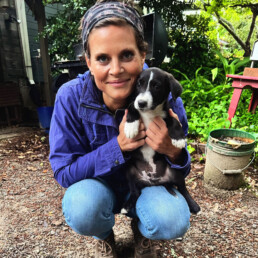
Warmly,

Chris Cabral, CEO
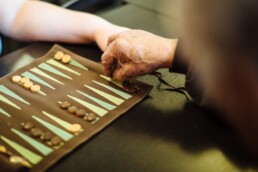
Mission Moment.
Jane was a lively spirit on a path full of success until her world was turned upside down. Like so many others, the start of the COVID-19 Pandemic marked the start of a tumultuous next few years. Jane owned her own business that was established in Petaluma almost two decades ago. However, the pandemic brought a drastic decrease in clientele and, after sustaining an injury, she had to close her doors permanently.
As Jane approached her mid 70’s in age, she was without a sustainable income, as social security did not cover the cost of living. Luckily, Jane had savings she could tap into as she prepared herself for what was to come next.
After moving her belongings into storage and attempting to file paperwork on her own to secure affordable housing, Jane was becoming desperate for help. With no hope or help, she started to starve herself and her body weight fell to 75 pounds.
When her savings were depleted and she was unable to secure stable and affordable housing, she was forced out of her home and onto the streets of the Petaluma community she had long been an integral piece of.
With no other solutions, Jane called a local shelter, COTS. Soon after speaking to a “kind” individual on the phone about the waiting list for a bottom bunk placement in the shelter at the Mary Isaak Center, Jane saw a light at the end of the tunnel. Jane applied to stay at COTS and was placed in COTS’ People’s Village for 13 months until she was accepted into permanent and affordable housing.
She made beautiful cards for everyone who had helped her at COTS, and hand delivered them to their office spaces before her moving day.
At 82 years of age, Jane was as excited as a kid in a candy shop looking forward to her new place. Jane is also planning on finding a way to contribute back to other people in need.
“I know where I’m going is a lovely place, and I feel honored to have been so fortunate as to get a residence like this.”
– Jane
Isaiah
Isaiah C., the founding real estate advisor at LivXplore Real Estate and Lifestyle, sat down to chat about his experience with COTS’ clients as tenants.
As a real estate license holder since the age of 18 and the winner of Sonoma County's Best Real Estate Agent by The Press Democrat in 2023, Isaiah has proved his exceptional dedication and commitment to excellence. Isaiah is a Sonoma County native who has earned a reputation for genuine client connections, knowledgeable development consultations, and all-encompassing real estate investments and ventures.
Isaiah’s first exposure to COTS was at the end of 2023 when a rental application of a former, now housed, COTS client crossed his desk. After Isaiah contacted the listed references, Eileen, COTS' Client Enrichment Manager, and the client's care manager, the process began.
With their voucher* in hand, the client was excited to begin the next step of their journey. Isaiah recalls the rental application, the United States Department of Housing and Urban Development (HUD)** paperwork, and lease agreements going smoothly and quickly.
“[With COTS,] it's not a super long and tedious process.”
Isaiah shared how the relationship between the property manager and the former COTS’ client has blossomed. The property owners realized that their tenant had a skillset in construction. The property owners then hired the tenant for multiple jobs and helped them broaden the client’s portfolio. The tenant and property owners still work together on projects if they fit into the schedule of the tenant’s booming remodeling career.
This housing placement was such a good fit and easy process that now Isaiah continues to reach out to Eileen to coordinate upcoming available units and potential clients to become tenants when they are ready.
Isaiah highlighted that sometimes an individual's qualifications on paper do not accurately predict the renting experience. Recalling previous experiences, Isaiah has faced major headaches with applicants who were perfect on paper. He noted that while there are always going to be bad tenants, he has not experienced that with individuals from COTS.
“I think you guys [COTS] do a very good job at aligning good people with good landlords and ensuring that there's some sort of support system in there.”
*Voucher holders are individuals who qualify for financial assistance with their rent. Voucher holders pay approximately 30% - 40% of their monthly income towards their rent and the city’s housing authority pays the remaining balance to the property owner directly.
** The utilization of vouchers only adds one additional agreement between the property owners and HUD stating that HUD is responsible for a predetermined payment amount each month. HUD does not step in on behalf of the tenants if the lease is violated and the tenant is asked to leave.
Remembering COTS' Volunteer, Margie Popp
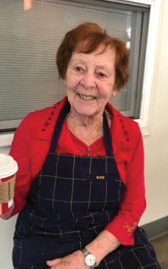
Margie Popp was COTS’ longest-serving volunteer, dedicating over thirty years to COTS and the former Petaluma Kitchen. Most of her service was spent as the lead volunteer for the lunch shift at Mary’s Table on Tuesdays, Wednesdays, and Thursdays. She was an example of service not only at COTS but in our community.
Margie lived in Petaluma for all 99 years of her life. In 1945, she started working as an “office girl,” earning 17 cents an hour for a 45-hour workweek. She worked for the same company for 38 years before retiring in the 1980s. After retirement, Margie sought other ways to fill her time and found a calling by feeding those in need.
Margie began her volunteer service at the Petaluma Kitchen, which is now COTS’ Mary’s Table program. Margie always felt called to help others by providing meals. Director of Programs, Robin Phoenix, recalled why Margie volunteered: “My mom used to feed the hobos on the railroad tracks. She said everyone needs to eat. I’m following in her footsteps to feed those who are hungry; she taught me this.”
Margie’s dedication and commitment were recognized over time, and she became the lead volunteer for her shifts. Margie often volunteered for over 50 hours each month! She often said it was the clients who kept her coming back year after year. Engagement Specialist, Diana Morales, remarked, “No one was more dedicated to the mission of COTS and the clients she served meals to.” Margie continued to serve until the Covid-19 pandemic made it too difficult for her to volunteer. Though many hoped she would return after the pandemic but it was too challenging at age 97.
During her time at COTS, Margie’s work profoundly impacted staff, clients, and fellow volunteers. We are deeply grateful for her legacy of service in our community!
To learn more about Margie’s service, read the Argus Courier article awarding her the 2014 Petaluma Volunteer of the Year Award.
Click here to read more about Margie’s life and legacy.
The COTS Collective: May 2024

May COTS’ Collective.
In 2023, COTS published anew 5-year strategic plan. We understand that solving homelessness requires a broad range of programs and services tailored to meet the needs of each unique individual. Through this planning process, COTS identified improving healthcare outcomes as a priority for us over the next five years—to that end, COTS is only weeks away from starting construction on a critical project to expand our existing RecuperativeCare program from six beds to twenty beds.
COTS’ Recuperative Care currently offers services, meals, and a place to heal for individuals exiting the hospital who are experiencing homelessness. The combination of a safe place to recuperate combined with supportive services is yielding incredible results. Recuperative Care sees 85% of its clients exiting to housing, another shelter, or a care facility—not back to the streets.
Recuperative Care also provides tremendous community benefits, saving our hospital and city partners hundreds of thousands of dollars by reducing emergency hospital visits and overnight hospital stays. Receiving care in the COTS Recuperative Care program is 25x less expensive than spending a night in the hospital.
We are thrilled to be expanding this critical program, but we need your help to move this project over the finish line! This construction project will cost COTS $490,000 to complete—so far, we are pleased to announce we have successfully raised $425,000.
Despite generous support from our community partners and donors, we still need an additional $65,000 to complete this important construction project. This project will serve vulnerable adults and seniors in our community for decades to come. Please consider a donation to support the successful completion of this project.
Thank you for working along side us to end homelessness in our community.

Warmly,

Chris Cabral, CEO
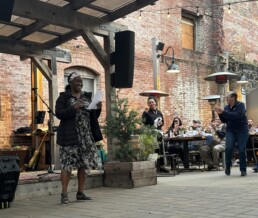
Mission Moment.
Having served as a firefighter, labored in construction, and worked health care, Christina has experienced many successes in life until she lost her way and home. Afraid for her safety on the streets, Christina knew she needed help.
After hearing about COTS, Christina decided to start there. She recalls being welcomed by Jesse, COTS Shelter Services Assistant, and the care managers.
Upon entering COTS, Christina was exhausted from living in fear. She spent her first days at COTS sleeping and smiling- grateful to have safety in the shelter.
While at COTS, Christing volunteered in the kitchen, joined a Recovery Group, and began going on staff-led nature walks. At COTS, she found people who supported her.
With the help of her care managers, she relentlessly searched for housing. When housing options finally became available, her care managers helped her with paperwork and finalizing her move. Nearly two years ago, she was able to move into housing and joyfully remains there today.
“I had the privilege to be shown support, so I could grow and do better, because we can’t do it alone. I’m so grateful for COTS . . . supporting me.”
-Christina
Christina's Story
During Hops for Homes 2024, former COTS client, Christina Hill spoke to attendees about her journey.
Having served as a firefighter, labored in construction, and worked health care, Christina had experienced many successes in life until she lost her way. After being afraid for her safety on the streets, Christina knew she needed to change her situation.
Having heard about COTS, Christina decided to start there. She recalls being welcomed by Jesse, COTS Shelter Services Assistant, and the care managers. They helped her file intake forms, gave her a tour of the Mary Isaak Center, and provided her with necessities such as clean towels and sheets.
Upon entering COTS, Christina was exhausted from living in fear. She spent her first days at COTS sleeping and smiling- grateful to have safety in the shelter.
After regaining some of her energy, Christina wanted to stay busy doing something positive and beneficial for COTS. She brought her love of cooking to Chef Janin’s attention and began volunteering in the kitchen. Christina was proud to volunteer and even prepare food for special events.
Aside from volunteering in the kitchen, Christina also joined a Recovery Group and began going on staff-led nature walks. At COTS, she found people who supported her. There were staff, clients, and volunteers who cared for her and became her friends. With unending care and support, Christina was able to come out of the darkness and into the light.
With the help of her care managers, she relentlessly searched for housing. When housing options finally became available, her care managers helped her with paperwork and finalizing her move. Nearly two years ago, she was able to move into housing and joyfully remains there today.
“I had the privilege to be shown support, so I could grow and do better, because we can’t do it alone. I’m so grateful for COTS . . . they supported me.”
Kevin's Story
In 2011, after living in Japan for 21 years as an English Instructor, Kevin, a former COTS client, returned to the United States. Upon his return, Kevin found himself in a tumultuous battle with undiagnosed depression. Over the next few years, his depression consumed him, leading to the loss of everything he had.
Left with nothing but the shirt on his back, Kevin reached a point where he believed the world would be better off without him. Despite several unsuccessful attempts to end his life, he found himself surviving under a bush with nowhere else to turn. Determined to make a final attempt, Kevin decided to walk to a nearby bridge.
During his walk, Kevin recalled hearing about a homeless shelter in Petaluma along his route. On a whim, he decided to visit the shelter, and upon entering COTS, he encountered compassionate individuals who helped him find hope again. Among those who made a significant impact was Debbie Robbins, a COTS Care Manager and Trainer, whom Kevin considers not just a caseworker but also a friend. He also expressed gratitude towards Emily, who assisted him with housing applications and paperwork, acknowledging their knowledge, patience, and kindness.
Before finding refuge at COTS, Kevin described himself as being at the "absolute bottom" of his life. However, upon moving into the Mary Isaak Center, his circumstances began to change. He spent six months there, before transitioning to a COTS Integrity Housing property in Petaluma. This allowed him to afford rent while working retail jobs, marking the beginning of a new chapter in his life.
During his time at Integrity Housing, Kevin utilized COTS’ services and sought help from psychologist Karen Duffy, who assisted him in obtaining an emotional support animal letter. This led him to find Zoe, his dog and loyal companion who provided invaluable support in managing his diagnosed major depression.
Earlier this year, nearly a year after welcoming Zoe into his life and around his 68th birthday, Kevin received news from Burbank Housing about an available opening that included a section eight voucher. Despite the daunting paperwork, COTS provided unwavering support, guiding him through the process and facilitating his move to Santa Rosa within a month.
Although apprehensive about leaving behind the supportive services of COTS and relocating from Petaluma to Santa Rosa, Kevin now expresses immense happiness. He appreciates his new surroundings, acknowledging the revitalization of the area following a recent fire.
Reflecting on his journey, Kevin credits COTS and the attention he received from Debbie Robbins and the organization for his survival and current contentment, emphasizing, "I'm alive today, thanks to COTS, and I'm here having a happy life."
Mental Health Matters at COTS
Thanks to your support, COTS provides life-changing services that keep our clients housed. Here are some of
their personal stories.
Geo’s Story
One of the things I value immensely with therapy is that I recognize a tendency in myself to beat myself up,
belittle myself and isolate myself. All the adjectives that describe self-sabotage. I judge myself harder than
the world does. Conversations with Karyn help bring it outside of me. I’m not the only person in the world
that this happens to, I’m sure
These conversations show me
1) that it’s not just me
2) that I am making progress
3) that I am dealing with old trauma
I need ongoing therapy to deal with all the traumas that will stay with me likely for life but with therapy I
can recognize triggers, symptomology and get help with not getting trapped in my dark and sticky gunk.
Sebastian’s Story
At 23 years of age, I have been homeless for the last 2 years.
Finally, I am housed thanks to COTS.
I have access to therapeutic resources which I would not have been able to do without COTS.
I have had therapists in my lifetime as I struggle with ongoing debilitating depression.
I am able to see Karyn weekly for the last couple of months.
It is really nice to have a therapist like Karyn who is casual but professional which makes me feel safe in
expressing difficult emotions.
Heather’s Story
Karyn is helping me understand me better and helping me be more aware of my surroundings, which I
have never done before. My brother Bobby has been telling me the same thing.
Karyn and the integrity housing program has helped me in my situation so much. I have been with COTS for
many years from my days at the Mary Issak center to the Integrity housing program.
I had access to Karyn’s good morning groups in house at the MIC to her women’s support group at the MIC
and now I have individual therapy with Karyn.
COTS has changed my life for the better. Thanks you so much!
Callie’s Story
Due to the nature of homelessness many people such as myself have limited support in the community.
It is very easy to become isolated and experience increased levels of depression.
Ongoing mental health services provide the support of having someone who reaches out. This means I am
not isolated, and a therapist can monitor the depths of my depression.
Without the support I have received from Karyn I would not be as healthy as I am now. As depression is an
ongoing illness, I think it can be managed but not cured.
The need to have helpful consultation is a necessity. Depression is unpredictable and circumstances
beyond a person’s control can trigger it to another level. This is where the support of a trained clinician has
kept me from going in to deeper waters and as my therapy has been ongoing for several years it continues
to give me hope of a less scary future.
Diana’s Story
Upon arriving at The Mary Isaak Center after experiencing life on the streets of Santa Rosa, I had no sense
of my place in this world. Not able to look at myself in a mirror, or in another person’s eyes, I was ashamed.
Part of my IAP-Individual Action Plan was to take part in group therapy, which I did, with Karin Duffy. I did
not trust the process or anyone in the group and participated only when called on.
Through self-examination I realized that the anger and fear inside of me, fight or flight, was not normal. I
signed up for individual therapy with Karin and was willing to be open and truthful with Karin as I was sick
of being in constant fight or flight mode.
With Karin, I was able to explore the childhood trauma I experienced at the hands of a teacher. Karin
guided me through the process, and I felt safe doing so.
8 years later, I have a wonderful support group to help keep me on track, Karin is still my therapist and
have been able to move past the traumas and focus on my family, my job at COTS and my future.
I am now a productive member of this community and I have a wonderful relationship with my family.
The COTS Collective: April 2024

April COTS’ Collective.
COTS, like other service providers, understands that permanent supportive housing is a transformative approach to addressing homelessness—with fewer than 5% of individuals returning to homelessness after placement in permanent supportive housing.
Permanent supportive housing offers long-term supportive services alongside subsidized housing. Services include assistance navigating healthcare, benefits, employment, childcare, and transportation. In addition, supportive services often include behavioral health support, group social activities, and education opportunities to help tenants understand their duties and rights as a tenant, and to help individuals develop long-term household budgets.
In 2023, COTS completed a new 5-year strategic plan—a large part of that plan is to add new permanent supportive housing units in our community.
The Studios at Montero is a 60-unit project located in Petaluma, CA. This project, which opened in 2023, has successfully housed more than 60 formerly unsheltered individuals and families, and has created a sense of community among tenants.
In addition, COTS operates many smaller units scattered throughout Petaluma, Rohnert Park, and Santa Rosa. One of the key components of scattered site permanent supportive housing is its decentralized nature. Instead of congregating individuals in one single location, COTS works with landlords and property owners throughout the community to secure safe and affordable housing options. This approach helps formerly unsheltered individuals integrate into the fabric of our community and promotes social inclusion.
In 2024, COTS has successfully added 14 units of permanent supportive housing in Santa Rosa, CA, bringing the total number of COTS-supported units to more than 100. We look forward to continuing to grow this important program.
Permanent supportive housing options are a powerful tool in the fight against homelessness. One of the most effective approaches to ending homelessness, permanent supportive housing offers individuals and families a pathway to permanent stability, self-sufficiency, and hope. COTS is proud to make such a profound impact on those we serve, and the community at large through these innovative approaches to housing.
We thank each of you for supporting our critical work and invite you to participate as a volunteer or donor. To learn more, please visit www.cots.org.

Until Next Time,

Chris Cabral, CEO
Mission Moment.
After living in Japan for 21 years as an English Instructor, former COTS client, Kevin, returned to the United States. Upon his return, Kevin’s depression consumed him, and he slowly lost everything.
When he was living under a bush, with nothing but the shirt on his back, Kevin decided the world would be a better place without him living in it. After making several unsuccessful attempts to end his life, Kevin decided to walk to a nearby bridge and make the final attempt at ending his life. On a whim, Kevin decided to visit a shelter that he had been told about and happened to be along the way.
Kevin quickly moved into the Mary Isaak Center, and his life began to change. He remained at the Mary Isaak Center for six months until he moved into a COTS Integrity Housing property in Petaluma. Integrity Housing is one of COTS’ Community Housing Programs, where COTS master leases properties and subleases individual rooms to adults and families experiencing homelessness. During his time at Integrity Housing, Kevin took advantage of COTS’ services and visited a psychologist and got an emotional support animal letter. With this letter, Kevin gained his furry friend, Zoe.
Almost a year after getting Zoe and right around his 68th birthday, Kevin received a call that there was a permanent housing opportunity for him and Zoe in Santa Rosa. The two of them moved in earlier this year and are ecstatic for the future.
“But, I mean, the reality is, I’m alive today, thanks to COTS. I’m here having a happy life, looking at the cutest dog in the world, [and] loving my life because of COTS and because of the attention that I received from Debbie Robbins and the organization.”
-Kevin
The COTS Collective: March 2024

March COTS’ Collective.
We hope this COTS Collective edition finds you well and filled with warmth knowing you are making a difference in the lives of our neighbors. Today, we want to share the remarkable impact of our winter Warming Center program operating at the Mary Isaak Center shelter.
While Winter in Northern California is often referred to as “mild,” being unsheltered during 40-degree nights with biting wind and heavy rain could hardly be described as “mild.” As one of the few providers in Sonoma County operating a warming center during the winter months, COTS experienced an influx of community members requiring shelter during our coldest nights.
This year, COTS served 123 individuals in our Warming Center program, offering a safe and warm sanctuary for overnight relief during the coldest months of the year. COTS also worked with these individuals to ensure everyone received an opportunity to apply for additional supportive services beyond the Warming Center, including ongoing shelter, housing search support, hot meals, and referrals to community resources.
The COTS Warming Center goes beyond providing shelter from the cold—we provide a lifeline for individuals experiencing homelessness, offering a community that cares. A community where individuals are seen, heard, and valued. COTS is a place where all individuals are treated with dignity and respect.
Through your support, COTS was able to expand our services this year, providing shelter and services at our Warming Center to more people than in any previous year. Access to warm overnight shelter prevents illness and serves as a crucial bridge to other supportive services—saving lives and improving Sonoma County for everyone.
We are all filled with gratitude for your ongoing support of our mission. Your generosity and compassion make this possible. Together, we are changing lives.
A SPECIAL NOTE
A few weeks ago, we shared a special note regarding the abrupt closure of Social Advocates for Youth (SAY.) Along with other community providers, COTS has continued to work alongside youth who were previously served by SAY. Our organization is humbled to have the opportunity to serve these youth, ensuring they receive needed housing support and ongoing services during this difficult community transition.
As our cherished supporters, COTS wants to assure you that we are in a strong financial position. Our commitment to transparency and accountability has enabled us to effectively steward the resources and investments you entrust to us.
Your contributions have enabled us to expand our reach and empower the community in new and exciting ways. As we look to the future, COTS remains steadfast in our dedication to fiscal responsibility and program excellence. Your continued support is crucial as we work towards our shared vision of a community where everyone has a place to call home.
Thank you for believing in us and standing by our side.

Until Next Time,

Chris Cabral, CEO

Thanks to Redwood Credit Union, Bill Gabbert, and Gene and Suzanne Valla, COTS has been challenged to raise $30,000 during Hops for Homes!
If we successfully meet our goal, they will DOUBLE the amount, doubling your impact!
